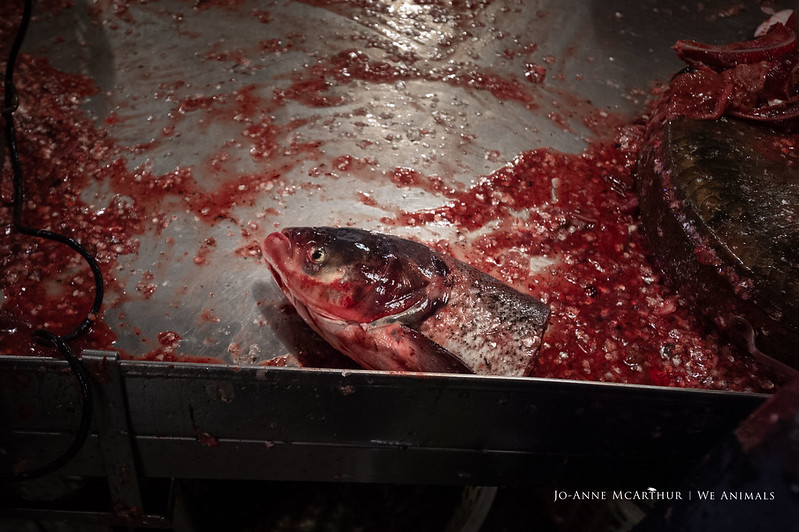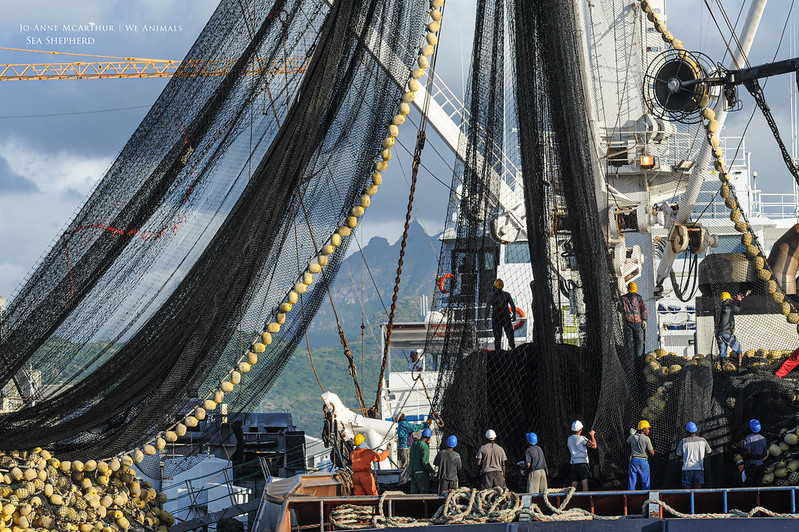World Oceans Day Opinion: Exploiting oceans is a fishy business
08 June 2020
By Dave Neale, Animals Asia’s Animal Welfare Director
As the Coronavirus continues to ravage public health systems and cripple economies across the globe, much of our discussion is rightly concentrated around the dangers of capturing, farming, transporting and ultimately consuming wild animal species.
To prevent the emergence of another pandemic, this trade in wild animals must be addressed, as must the appalling conditions inside the intensive farms which produce billions of hens, pigs, cows and others for us to eat.
Whilst we concentrate our thoughts and our efforts on these trades in essentially terrestrial species, we largely ignore the far greater trade in aquatic animals for food and the impact that this is having on individual animals' lives and the environment.
Estimates suggest that some 50-160 billion farmed fish, 0.7-2.3 trillion wild fish, 43-75 billion farmed crayfish, crabs and lobsters, and 210-350 billion farmed shrimp and prawns are slaughtered each year for consumption.
Concentrating upon the wild caught individuals alone we are dealing in numbers incomprehensibly large for us to be able to grasp, with each individual animal likely to suffer a slow and distressing death as they are ripped out of their ocean home.
Commercial fishing causes suffering that is both severe and often lengthy in its duration. This suffering takes place during capture, landing and processing. Fish experience fear, pain and distress as they are pursued to exhaustion by nets, once caught many are crushed under the weight of other fish as trawl nets are heaved to the surface, being raised from deep water many will suffer from the effects of decompression, others are snared in gillnets, confined in constricted seine nets, caught on hooks, and larger species are spiked with hooks to bring them aboard.
Out of the water, the majority will suffocate due to their inability to breathe, or from a combination of suffocation and live gutting as they are stabbed and opened up. Many commercial operations instantly chill the fish after capture and this can prolong their suffering as they suffocate. Some species may remain conscious for up to 2 hours after landing and storage.
Suffering is also caused to fish used as live bait. Pole and line fishing uses fish as bait to catch larger species such as tuna, with fishermen creating a feeding frenzy by throwing small bait fish, usually live, from the ship, and fish being impaled on hooks to attract the target species.
In addition many millions of fish and other animals including turtles, dolphins and porpoises are caught as bycatch with countless more including whales dying due to entanglement in discarded fishing gear.
All of this pain and all of this suffering is inflicted upon literally trillions of animals that can feel pain and experience fear and distress. Fish are sentient, they are aware of a range of sensations and emotions, they have the ability to suffer physically and mentally through fear and distress, and the ability to experience a state of well-being. They are aware of their surroundings and of what happens to them, and what happens to them matters to them as individuals.
Fish are complex in their emotional and cognitive abilities. Many species learn socially by watching other members of their group carry out tasks and copying their actions. Certain species are known to use tools to help them to catch their prey or to open tough shells. They cooperate with each other and with other species to perform tasks such as hunting and avoiding being hunted.
They develop social bonds with each other, they like to play and they communicate their intentions and their emotional states. They can be crafty and deceptive, they are good planners and they have excellent memories.
Some species have also demonstrated the ability to count by clearly distinguishing between different numbers of objects, a skill once thought to be limited to humans. Others are even known to develop their own ‘social rules’ of behaviour and reprimand individuals that break these rules, and certain species are known to ‘apologise’ to others they have harmed.
All of this provides evidence of the true complexity of fish emotional capacities and cognitive abilities, yet still we treat them with little moral regard causing immense suffering to many trillions of individuals each year.
On World Ocean Day please take time to think how your actions could be impacting upon their lives. You have the power to end their suffering through the choices you make each and every day.
Make the choice to leave them in the ocean where they belong.
See - Rethink fish
BACK







